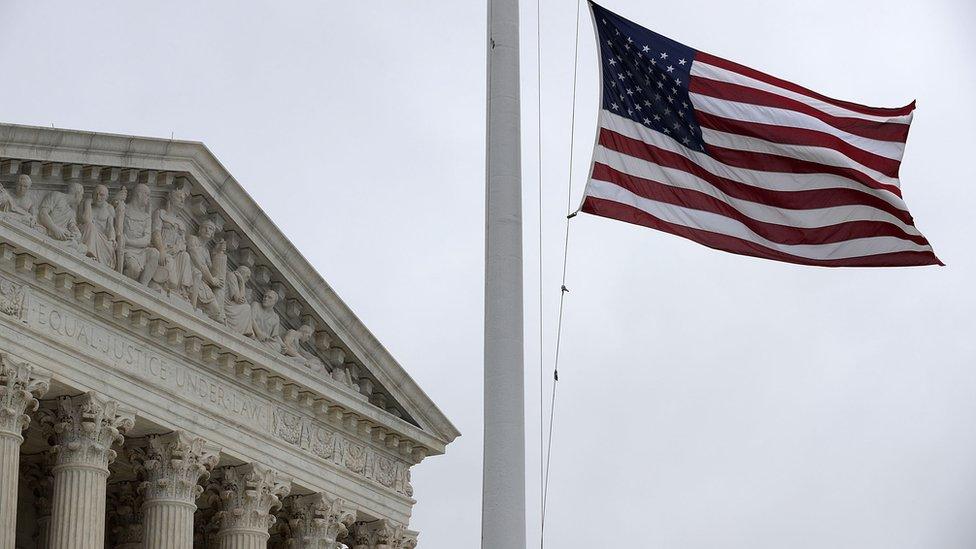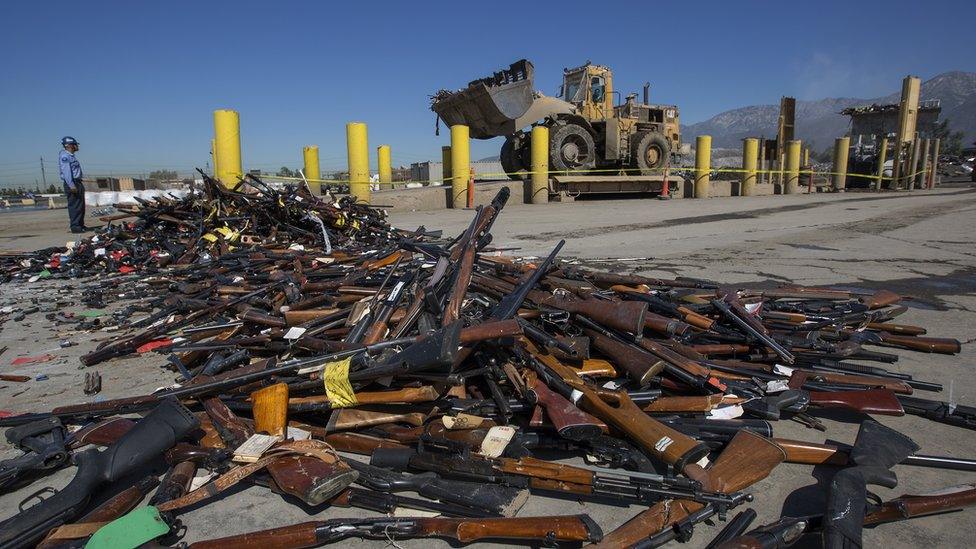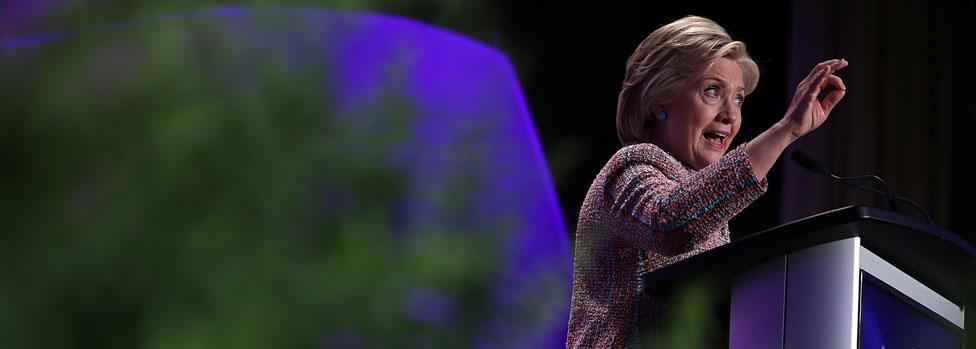US election: What's at stake for Supreme Court?
- Published
What's at stake in the US election: Supreme Court
For Donald Trump, the election is "all about the Supreme Court". And his opponent has said the issue of the court raises the "central issue" of the election. So what is at stake?
It's unusual that an election is fought with a space on the Supreme Court for a judge.
The death in February of Antonin Scalia, one of the conservative justices, has made the future of the court a rallying point for many Republican voters.
His absence means the Supreme Court, which serves as the final arbiter on matters of great political and social consequence, is now balanced 4-4 between liberals and conservatives.
President Barack Obama has nominated a replacement but the Republican-controlled Senate has refused to consider it.
And with three of the eight remaining justices over the age of 70, the next president could get to nominate more than one.
Meet the Supreme Court justices
The biting wit of Justice Antonin Scalia
So what are the key issues?


WHAT HILLARY SAID
I feel strongly that the Supreme Court needs to stand on the side of the American people, not on the side of the powerful corporations and the wealthy. For me, that means that we need a Supreme Court that will stand up on behalf of women's rights, on behalf of the rights of the LGBT community, that will stand up and say no to Citizens United, a decision that has undermined the election system in our country because of the way it permits dark, unaccountable money to come into our electoral system.
I feel that at this point in our country's history, it is important that we not reverse marriage equality, that we not reverse Roe v Wade, that we stand up against Citizens United, we stand up for the rights of people in the workplace.
WHAT TRUMP SAID
We need a Supreme Court that in my opinion is going to uphold the Second Amendment [ the right to bear arms]... which is under absolute siege. I believe if my opponent should win this race, which I truly don't think will happen, we will have a Second Amendment which will be a very, very small replica of what it is right now.
I feel that the justices that I am going to appoint - and I've named 20 of them - the justices that I'm going to appoint will be pro-life. They will have a conservative bent. They will be protecting the Second Amendment. They are great scholars in all cases, and they're people of tremendous respect. They will interpret the Constitution the way the founders wanted it interpreted. And I believe that's very, very important.

Abortion
When asked at the third debate, Mr Trump said he expects the landmark 1973 ruling on abortion, Roe v Wade, to be overturned under his presidency.
"That'll happen automatically, in my opinion, because I am putting pro-life justices on the court," he said.
If that ruling was overturned, that would mean all 50 states would decide their own abortion laws.
Mrs Clinton said she would defend Roe v Wade, and resist moves in some states to restrict women's access to abortions, although it's not clear how she would do that.
Despite being evenly divided, the court struck down stringent abortion regulations earlier this year.

Gun rights

Weapons seized by police in LA are destroyed
Mr Trump has vowed to uphold the right to bear arms and appoint justices who chime with his thinking. His website also says, external he wants to "empower law-abiding gun owners to defend themselves", although there are no details how.
This is the first election in 16 years in which a Democrat has made gun laws one of their key issues. Mrs Clinton wants a ban on gun sales to people who are on the terror watch list, an aspiration shared by her rival.
But she is also pushing for the introduction of background checks for buyers purchasing online and at gun shows.

Gay marriage
The Republican candidate has consistently said he opposes same-sex marriage, in interviews going back a number of years.
And earlier this year, he told Fox News, external he would appoint Supreme Court justices who would reverse the nationwide ruling that made same-sex marriage the law of the land.
"If I'm, you know, if I'm elected, I would be very strong on putting certain judges on the bench that I think maybe could change things," he said.

Citizens United

Clinton wants a constitutional amendment
A 2010 ruling, known as Citizens United, allowed corporations, labour organisations and wealthy donors to donate millions of dollars through groups known as super PACs. Such groups can raise and spend unlimited money, but are not allowed to co-ordinate with the candidates they support.
The ruling was justified by the judges on the basis of free speech, because they overturned a prohibition on electioneering in the period running up to a vote.
Mrs Clinton has vowed to appoint a justice that can achieve her goal of quashing this ruling, which she condemns as allowing "secret money" to be used for political means. She wants to introduce a constitutional amendment within her first 30 days in office, if she's elected president.
"The amendment would allow Americans to establish common sense rules to protect against the undue influence of billionaires and special interests and to restore the role of average voters in elections," a Clinton spokesman said in statement.

Immigration reform
In June, the Supreme Court announced it was split on President Barack Obama's plan to shield millions of undocumented immigrants living illegally in the US.
A group of 26 states, led by Texas, had sued the US government challenging the legality of his unilateral executive action in 2014 which would grant the right to work to millions.
Mrs Clinton goes further in her immigration plans than Mr Obama, wanting a clear path to citizenship for undocumented people. But Mr Trump has probably the most hardline stance of any candidate in history.
He wants a justice who will help roll back the Obama plan and one who shares his views on deporting people living illegally.